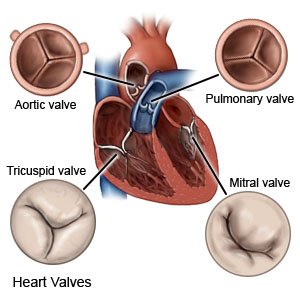Mitral Valve Open Commissurotomy
Medically reviewed by Drugs.com. Last updated on Sep 23, 2025.
WHAT YOU NEED TO KNOW:
Mitral valve open commissurotomy is surgery to repair the mitral valve in your heart. The mitral valve normally opens and closes to let blood pass through the heart. If the valve does not open or close correctly, blood may not flow well through your heart.
 |
HOW TO PREPARE:
Before your surgery:
- Tell your surgeon about all medicines you currently take. He or she will tell you if you need to stop any medicine for surgery, and when to stop. He or she will tell you which medicines to take or not take on the day of surgery.
- Arrange to have someone drive you home when you are discharged from the hospital.
- You may need blood tests before your procedure. Talk to your healthcare provider about these or other tests you may need.
The night before your surgery:
You may be told not to eat or drink anything after midnight.
The day of your surgery:
- You or a close family member will be asked to sign a legal document called a consent form. It gives healthcare providers permission to do the procedure or surgery. It also explains the problems that may happen, and your choices. Make sure all your questions are answered before you sign this form.
- Take only the medicines your surgeon told you to take.
- An anesthesiologist will talk to you before your surgery. You may need medicine to keep you asleep or numb an area of your body during surgery. Tell healthcare providers if you or anyone in your family has had a problem with anesthesia in the past.
WHAT WILL HAPPEN:
What will happen:
- General anesthesia will be given to keep you asleep and free from pain during surgery. Your surgeon will make an incision in the middle of your chest. You will be connected to a heart-lung bypass machine. This machine does the work of your heart and lungs during surgery. The valve will be repaired. Then your heart will be checked for bleeding. Wires may be put in your chest to improve your heartbeat. The wires will stay there in for a short time after surgery. The bypass machine will be removed, and your own heart and lungs will start working again.
- A transesophageal echocardiogram (TEE) will be done to see how well the valve and your heart are working. The incision in your chest will be closed with stitches or staples and covered with a bandage. The bandage keeps the area clean and dry to prevent infection.
After surgery:
You will be taken to the recovery room or an intensive care unit (ICU). Healthcare providers will watch you closely. A healthcare provider may remove the bandage shortly after surgery to check the stitches. Do not get out of bed until your provider says it is okay.
CONTACT YOUR HEALTHCARE PROVIDER IF:
- You have a fever.
- You have questions or concerns about your surgery.
Risks
You may bleed, develop an infection, or have trouble breathing during or after surgery. Air bubbles in your blood could cause a stroke. The muscles or other valves in the heart could be damaged. You may have problems with your heartbeat or have a heart attack. Your kidneys may stop working and you may need dialysis. You may get a blood clot in your arm or leg. The clot may travel to your heart or brain and cause life-threatening problems, such as a heart attack or stroke.
Related medications
Care Agreement
You have the right to help plan your care. Learn about your health condition and how it may be treated. Discuss treatment options with your healthcare providers to decide what care you want to receive. You always have the right to refuse treatment.© Copyright Merative 2025 Information is for End User's use only and may not be sold, redistributed or otherwise used for commercial purposes.
The above information is an educational aid only. It is not intended as medical advice for individual conditions or treatments. Talk to your doctor, nurse or pharmacist before following any medical regimen to see if it is safe and effective for you.
Further information
Always consult your healthcare provider to ensure the information displayed on this page applies to your personal circumstances.
